Ingredients of food thickener
-
Last Update: 2017-11-29
-
Source: Internet
-
Author: User
Search more information of high quality chemicals, good prices and reliable suppliers, visit
www.echemi.com
Introduction: you may have some knowledge about thickeners Many of our foods are added with thickener ingredients What are the ingredients of food thickeners? Is it safe to add thickeners to foods? Let's introduce them to us Food thickener: it refers to the macromolecular substance that can dissolve in water and fully hydrate under certain conditions to form a viscous and greasy solution, also known as food glue The main functions are adhesive, encapsulation, film forming, demoulding, lubricating, bulking, expanding, crystallization control, clarification, turbidity, emulsification, gel action, protective effect, stabilization, suspension, shrink proof agent, foaming agent Common thickeners: gelatin; sodium caseinate; Arabic gum; tamarind polysaccharide gum; sesbania gum; agar; sodium alginate (sodium alginate, alginate); carrageenan; pectin; xanthan gum; β - cyclodextrin; sodium carboxymethylcellulose (CMC Na); sodium starch phosphate (sodium starch phosphate); sodium Carboxymethylstarch; hydroxypropyl starch; What are the ingredients of PGA? The basic chemical composition of the thickener: for most thickeners, their basic chemical composition is monosaccharide and its derivatives Rare monosaccharides include glucose, glucuronic acid, mannuronic acid, rhamnose, pregalactose, glucuronic acid, galactin, galacturonic acid, etc For example, hydroxypropyl Di small powder hydrochloric acid ester is a kind of small powder biology; the secondary component of gelatin is peptone; pectin is a kind of dietary fiber Food thickeners are attributed to the spirit of large members, and the vast majority of them are not attracted by human food accumulation after entering the human body If glue, guar gum, carrageenan, etc., their functions are similar to those of dietary fiber Most thickeners are similar to gelatin, which can be eaten by human body, but the secondary component of gelatin is peptone, which can be synthesized into cholesterol acid and then participate in human metabolism, which is the nutrient spirit that can attract application Is it safe to add thickeners to food? According to the small edition of Baibai safety net, common thickeners are actually "natural products" For example, agar and carrageenan are extracts of seaweed; gelatin is hydrolyzed and boiled from animal skin or bone; the "advanced" pectin in edible gum mainly comes from orange skin and apple juice residue Only a few thickeners are processed by certain chemical reactions, such as carboxymethylcellulose However, their safety has been widely tested, and no harm to health has been found The above is a brief introduction of food thickener I believe you all have a simple understanding If you want to know more about food safety, you can pay attention to food safety knowledge and learn more about food information Editor in charge: he xianrob
This article is an English version of an article which is originally in the Chinese language on echemi.com and is provided for information purposes only.
This website makes no representation or warranty of any kind, either expressed or implied, as to the accuracy, completeness ownership or reliability of
the article or any translations thereof. If you have any concerns or complaints relating to the article, please send an email, providing a detailed
description of the concern or complaint, to
service@echemi.com. A staff member will contact you within 5 working days. Once verified, infringing content
will be removed immediately.







